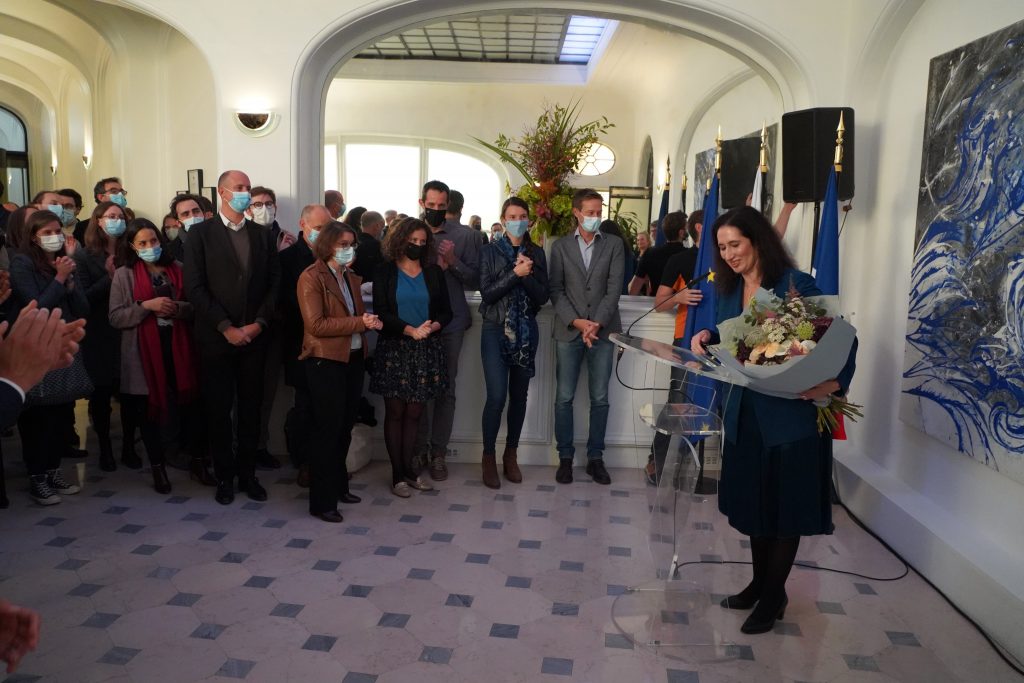
SSNIPpets (47): Dinner is served
There is a lot to catch up on before the new year really gets going. Rupprecht Podszun, however, has once again only written down very subjectively what he came across in the last few weeks. Today it’s about Section 19a of the German Competition Act, the Digital Markets Act, big law firms, thin and thick books, personnel matters and access to data. Enjoy the first 2022-SSNIPpets – small but significant news, information and pleasantries – our pet project!
Alphabet is an “UPSCAM”
What’s the best way to start a year? With fireworks, of course! And if pyrotechnics is not allowed (as in parts of Germany this end of year), then at least you could have a little firecracker on your table from the Bundeskartellamt in Bonn. On 5 January 2022, the Office announced in a press release that Alphabet/Google was a norm addressee of Section 19a of the GWB, a so called “UPSCAM” (undertaking with paramount significance for competition across markets). 19a is the revolutionary instrument that the legislator of the 10th amendment of the German competition act created for digital gatekeepers.
Let’s put it this way: for antitrust lawyers, this is about as surprising as the Mulligatawny soup at Dinner for One. [To our English readers: Germans have as their New Year’s Eve-routine to watch a lovely little TV programme in English called Dinner for One – allegedly rather unknown in England]. Alphabet is not alone at the table like Miss Sophie in that clip: the decisions to establish the norm addressee status (Section 19a (1) GWB) against Meta/Facebook, Amazon and Apple are in the pipeline. Pursuant to Section 19a (1) sentence 3 GWB, gatekeeper status is assigned for five years. Alphabet will not challenge the first step now taken at court.
The finding does not change anything yet – only when the 7th Decision Division of the Bundeskartellamt makes use of the powers in Section 19a (2) GWB does it become a serious threat to Google’s profits. The general public has nevertheless said “Oooh!” and “Aaaah!” when the firecracker went off. Perhaps this is a deceptive joy. The resolution, which has no consequences for the time being and is said to have around 200 pages, gives the public the impression that the power of the Silicon Valley corporations is already being actively restricted. Yet, one year after its enactment, nothing has happened on the basis of Section 19a. The Digital Markets Act (which could one day effectively supersede 19a) has not even been passed.
DMA: Well-intentioned…
Simonetta Vezzoso, a very active professor at the University of Trento, had recently tweeted that we might have been fighting for a piece of legislation in the Digital Markets Act that will not change anything in practice – and thus we might have been distracted from real solutions (interoperability!).
Via newspaper Frankfurter Allgemeine Zeitung, Stefan Herwig gave me a fright with the headline that the same mistake is happening with DMA and DSA as with the GDPR. The GDPR has virtually become a synonym for the case that a legal act is well-intentioned, but primarily creates bureaucracy without solving the actual problems. The DMA is certainly far from perfect, but is it that bad?
Herwig says the Commission focuses too much on network effects as the core problem and overlooks other market failures. Yes, network effects and the resulting “tipping markets” are a key issue for digital giants. But other misalignments should be taken into account, too: the corporations have been “legally trained” that they are not liable for anything – neither for problematic and infringing content on their platforms, nor for data scandals.
“With players scaling rapidly in size, the revenue and expenditure sides thus diverge more and more. Spending on precautionary measures – here, for example, the cost of efficient content moderation – no longer grows in proportion to revenues because you simply pass your digital fallout, such as hate speech and disinformation, onto society.”
Herwig in the Frankfurter Allgemeine Zeitung
The champions of externalising costs from the USA would not even have to pay anything for the network infrastructure, which they receive at best price conditions thanks to net neutrality. And taxes – well…
Herwig’s bitter conclusion: “None of these problems is addressed by DSA and DMA.” That is an exaggeration, but the strong statement is timely: I have been trying to advocate with my colleagues in the antitrust community that we are not only dealing with competition problems. That’s why I think it’s right that the DMA also names “fairness” as a goal and not just “contestability”. At least there is still a chance: As Philip Marsden and I have been preaching for years: Enforcement matters! The fact that the GDPR has not really taken off is partly due to the fact that the Irish data protection authority does its job about as successfully as an average government agency in the city of Berlin (and if you ever tried to get anything from a Berlin agency you know what I mean). If we get enforcement right with the DMA (e.g. with private enforcement and strong involvement of national authorities), there is still some hope.

Delicacies from Austria
The fact that the former Austrian Chancellor Sebastian Kurz has signed on with Silicon Valley investor Peter Thiel… somehow one thing leads to another. Thiel inscribed himself on my Power Point slides with a powerful statement: “Competition is for losers”. With this he once summed up the Silicon Valley monopolisation strategy. In an interesting read, the Standard from Vienna characterised Thiel’s thinking as maximally liberal, but hostile to democracy.
From this article I also learned that the former law student Kurz was supposed to give the laudation for Thiel at the award ceremony of the Frank Schirrmacher Prize, but it didn’t happen because Mr Kurz, fallen from grace, wanted to take care of his baby or something… Journalist Nils Minkmar tweeted that Schirrmacher would be furious in view of the Thiel/Kurz constellation for an award named after him. I agree: no one in Germany promoted criticism of big tech as vigorously as the late newspaper editor Schirrmacher did so early on. And hardly anyone stands up for the negative excesses of the big tech system as hard as Donald Trump-supporter Peter Thiel.
Since Kurz was an Austrian affair, let’s stay there for a moment: The guidelines on the transaction volume threshold in Germany have been revised. Since the new version can hardly be found on the website of the Bundeskartellamt, here is the link. The paper was co-authored with the Austrian Federal Competition Authority (Bundeswettbewerbsbehörde, BWB), which is why it has two versions of “January” on the cover page: Januar (as the Germans put it) and Jänner (as the Austrians do).
The long-time head of the BWB, Director General Dr. Theodor Thanner, has resigned from office a few months before the end of his regular term. What this means can probably only be understood in the coffee houses of Vienna. Thanner had been at the helm of the authority since 2007 and had set up the BWB in a modern way. Dr. Natalie Harsdorf-Borsch, Thanner’s deputy, will lead the agency ad interim.

Read no weep
People tend to buy a second book, they once quipped in bookselling circles. Fact: The trend is towards second libri amicori or “Festschrift” as the Germans put it. Two current proofs in print are available.
A law firm with its headquarters in Stuttgart, whose name shall not be mentioned here because I do not want to advertise specific law firms (law firm bashing is more okay, I guess?!), has published a liber amicorum for Rainer Bechtold on his 80th birthday. Lawyers from the antitrust practice group of this law firm have written on current topics to express their gratitude to their senior (who received a first major commemorative publication on his 65th birthday). Every competition lawyer in Germany has Rainer Bechtold’s commentary on the GWB on his or her desk, so he is known even though that book is now authored by Wolfgang Bosch. But those who know the name mainly from the writings will be awestruck when they study the list of selected cases in which he was involved – it ranges from the Daimler/Chrysler merger to the sugar cartel to John Deere.
While the Bechtold book has the format of a nice PhD thesis (256 pages, paperback), the second Liber amicorum is the real thing, according to German standards of “Festschrift”: heavy book, highly serious photo of the jubilarian, ambitious title. This one is dedicated to Franz Jürgen Säcker, who also turned 80. Säcker ist one of the most prolific former competition law professors in Germany. The 745 pages of “Selbstverantwortete Freiheit und Recht” (Self-Responsible Freedom and Justice) weigh 1.36 kg, and Detlev Joost, Hartmut Oetker and Marian Paschke are once again the editors (as with the first Festschrift for Säcker on the occasion of his 70th birthday). The fact that the three are not primarily active as antitrust lawyers, but that their academic teacher is nevertheless a legendary competition law professor in Germany, already says something about the scope of his work. Antitrust law is referred to here as “General Commercial Law”, and the table of contents shows who penned the book on which topic. Happy reading and happy birthday to the two!

Big Law
The Economist writes that “big law” is becoming more and more like its clients. Such a headline naturally makes me sit up and take notice, as I like to read stories from the glittering galaxy of the big law firms – me being wrapped in the cosy jerkin of the civil servant and grounded by the demands of public service in Germany. The Economist’s thesis: the small law firms with maximum national appeal have become global players. I can hear you yawning, dear readers, of course this is nothing new. What is new, at best, is that in the pandemic lawyers billed more (after all, you can work remotely 24/7 and in sweatpants). From a competitive perspective, however, I found three aspects remarkable:
- It is no longer just merger activity (which is at record levels) that is fuelling the law business. Antitrust law and the regulation of digital platforms are driving the lawyers’ pulse. The senior partner of one firm is quoted as saying that these are “challenges for business and bright spots for lawyers”. I can literally see his smirk.
- Eat what you kill, the principle that income goes primarily to the person who generated it, is gaining ground. Within the firm, this means: competition instead of solidarity. “Partners” become lone warriors working in parallel.
- Finally: “Big law is becoming not just bigger but also more concentrated. (…) A handful of superstar firms like (…) are better able to serve clients wherever and in whatever capacity they need serving, to deal with an inevitable uptick in overheads as the world puts the pandemic behind it, and to poach talent from weaker rivals.” I see a sector inquiry on big law firms incoming!
Search for young talent
Another trend is that law firms are opening offices in the “erstwhile legal backwaters”. Juve, the German law magazine, reported that a major law firm, also famous in antitrust, is opening an office in the Westphalian town of Münster of all places, where rents are cheap, graduates are willing, and anyone who questions the existing order too radically is hung in a cage on the Lamberti church tower. That is the competition for the best minds.
These minds are earning more and more. Nowadays, a young lawyer (m/f/d) in Germany can demand 160,000 euros as a starting salary for an associate. I’m not going to write the big lament about the “risk of poverty in the public service”. But I do understand that some people who, as civil servants, have explored the “limits of growth”, may feel fainthearted. In Brussels, at least three high-flyers from the Directorate General for Competition have switched to the legal profession, as MLex and Politico reported: Nick Banasevic has moved to Gibson Dunn, Cecilio Madero to Clifford Chance and Carles Esteva Mosso to Latham Watkins. That’s a wow! Banasevic! Madero! Esteva Mosso! Switching sides!
Possible conflicts of interest have not gone unobserved. A question in the European Parliament to the Commission on the Esteva Mosso case brought to light for me that there are rules for these cases and that they were also applied in this case – Esteva Mosso can only serve his new employer to a limited extent. How this plays out in practice is another matter.
And what does Mundt say about this?
Revolving doors are rather rare for German antitrust lawyers, and I don’t see Julia Topel becoming a partner at Hengeler in the foreseeable future or Felix Engelsing joining Linklaters as Of Counsel. I asked Andreas Mundt, President of the Federal Cartel Office, what he thinks of these defectors. His answer will really surprise you…
You want to know this answer? Then you absolutely have to listen to the next episode of the podcast “Bei Anruf Wettbewerb” (When Competition Calls)! In this format, economics professor Justus Haucap and I talk every fortnight about topics in antitrust law and competition economics, and we invited President Mundt for the first episode in 2022. Of course, that was a feast for us! You find out things you didn’t know before: Which childhood dream Andreas Mundt had. How the position in the office on Section 19a is coordinated. And what right the Federal Cartel Office should have, but which Mundt does not dare to demand publicly (but only in our cosy podcast studio). We will put the episode online on 13 January 2022, until then you still have time to catch up on last year’s episodes you haven’t heard yet. “When Competition Calls” is available on all the usual podcast platforms, for example here. But it’s in German.

Contribution of the year 2021
If you think you’ve already made it through the advertising break of this blog post, I have to disappoint you. I must once again praise our Antitrust Advent Calendar. Oh, why should I do it myself? Let others speak: One judge wrote:
“D’Kart is always worth a read!”
And a very senior figure from enforcement wrote:
“Thank you also for sharing the 2021 edition of the Advent Calendar. I enjoyed it very much.
Congratulations to you and your team for keeping many of us in good spirits. “
Oh, my heart swells. When such messages come in, I immediately pass them on to my Philipps, the research assistants Philipp Offergeld and Philipp Bongartz, who have rendered outstanding services to the blog in general (Offergeld) and the Antitrust Advent Calendar in particular (Bongartz). In the Advent Calendar, we asked you for your insider knowledge via a quiz this time. You had to know how the name “Vestager” is pronounced correctly, how many litres of beer were at stake in the Delimitis case of the ECJ and which strategic decision the Commission considered permissible despite the enforcement ban in the Altice case. My personal highlight of the Advent calendar was the 24th panel with the former Chief Economist of the Directorate General Tom Valletti. It was great that he took part. Would you like to watch it? Click here to go to the Advent calendar! (And this is in English!)
Deadline : ASCOLA Annual Conference 2021
By the way, the submission deadline for the ASCOLA Annual Conference 2022 is 27 January 2022. ASCOLA is the Academic Society for Competition Law, only academics are admitted. This year we will meet in Porto at the end of June/beginning of July. We have had this plan for the last two years, but this year it really works! You can find the Call for Papers here.
Merci, Isabella de Silva!
A job change from France startled many people including Isabelle de Silva and me last year: Madame de Silva has earned great merit as head of the French Autorité de la Concurrence. (Whether de Silva’s tenure also includes the establishment of an Instagram channel, I’m not sure, and I’m not sure yet what I think about this, but your kids can find that channel here.)
De Silva is well known throughout Europe, her cooperation with the German Federal Cartel Office was fruitful, her office’s approach tough and innovative. Apparently to her own surprise, her mandate was not extended; on 13.10.2021 she had her last working day at the AdlC. In France, rumour has it that Monsieur le Président feared her opposition to a spectacular merger of television providers. Macron needs the TV stations for his re-election.
“I leave with a conviction. Competition is not the solution to all ills, but it is the guarantee of a dynamic economy, which breathes and makes room for new entrants, who bring the wind of innovation. As the post-Covid-19 recovery starts to take shape, more than ever, the French economy needs competition and an Autorité to keep it vibrant.”
Isabella de Silva in her farewell speech at the AdlC
In her farewell speech, the closing words of which we reproduce here, she also said a few sentences about this media merger. Of course, they are so artfully put that everyone can read what he or she wants to read from them. De Silva is now a member of the Conseil d’Etat. This institution, which has existed since the 18th Brumaire VIII, can only really be understood if one doesn’t think Marianne to be a pop star, has already discussed Voltaire and Rousseau in the école maternelle and doesn’t leave the house without a dark blue cashmere jumper. Benoît Coeuré, currently working at the Bank for International Settlements in Basel, is to be de Silva’s successor. I don’t know much about him, but Wikipedia reports that he, as a member of the ECB’s Executive Board, had divulged insider information to hedge fund representatives and bankers at a dinner. Santé!

Take me out for dinner
Speaking of dinner: Many people are probably wondering right now how long there will be restaurants if the pandemic continues. The Economist has turned the question around: since when have there actually been restaurants? For a long time, I learned from the journalistic tidbit, it was considered indelicate to dine in public. Those who were able to afford more than a bite dined at home. Street food was for the poor. That changed in the second half of the 18th century. And why? Of course! The three-star chefs among the historians assume
“that the restaurant emerged as a result of improvements in competition policy.”
Reason: Previously, guilds made it difficult to sell more than one product at the same time – the butcher offered meat, the vintner wine, both together were not possible until the regulatory blender mixed up outdated limitations. If only the world knew what it owes us!
Access to data
Last note for today: data access is and will be a huge issue. In a book published last year and available free of charge here, I outlined what service providers could face if they do not have access to important interfaces in the future. Self-owned companies will become more and more dependent on the networks. Politico recently reported in an article on “Big Tech’s Next Monopoly Game” how Google and the like try to get exclusive access to car data.
On 2 February 2022, we will discuss the topic of “Data Access for Service Providers” digitally with an exciting line-up of experts such as Wolfgang Kerber, Philipp Voet van Vormizeele, Gerhard Klumpe, Rebekka Weiß, Alexander Barthel and Justus Haucap. The event is being organised by my University together with the ministries of justice and economics of North-Rhine Westphalia. Hope to see you there (online) (if you have a decent command of German)!

All the best for the new year – stay in good spirits!
Rupprecht Podszun
Prof. Dr. Rupprecht Podszun is one of the directors of the Institute for Competition Law at Heinrich Heine University Düsseldorf and editor of this blog. He is also the Vice President of ASCOLA, the Academic Society for Competition Law.
Disclosure: The text was amended after publication to clarify some issues that had not been really understandable for non-native German readers (or so we thought).